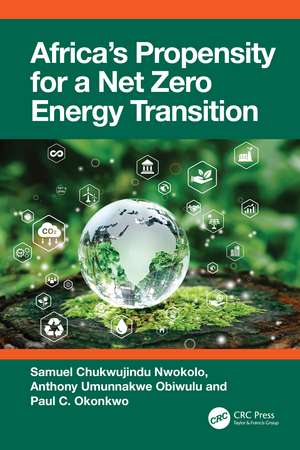Africa’s Propensity for a Net Zero Energy Transition
Autor Samuel Chukwujindu Nwokolo, Anthony Umunnakwe Obiwulu, Paul C. Okonkwoen Limba Engleză Hardback – 18 noi 2024
Features:
- Offers unique insights into the specific challenges and opportunities that Africa faces in achieving a net zero energy future.
- Provides comprehensive understanding of the region's renewable energy potential, including analysis of policies and initiatives driving sustainable development.
- Highlights successful case studies, emerging technologies, and the economic and environmental benefits of transitioning to net zero energy.
- Explores the role of international collaborations and partnerships in supporting Africa's journey toward a net zero energy future.
- Discusses solutions that must be tailored to the specific needs and contexts of African countries.
Preț: 938.75 lei
Preț vechi: 1031.59 lei
-9% Nou
Puncte Express: 1408
Preț estimativ în valută:
179.65€ • 186.49$ • 149.80£
179.65€ • 186.49$ • 149.80£
Carte tipărită la comandă
Livrare economică 22 martie-05 aprilie
Preluare comenzi: 021 569.72.76
Specificații
ISBN-13: 9781032773438
ISBN-10: 103277343X
Pagini: 374
Ilustrații: 2
Dimensiuni: 156 x 234 mm
Greutate: 0.85 kg
Ediția:1
Editura: CRC Press
Colecția CRC Press
ISBN-10: 103277343X
Pagini: 374
Ilustrații: 2
Dimensiuni: 156 x 234 mm
Greutate: 0.85 kg
Ediția:1
Editura: CRC Press
Colecția CRC Press
Public țintă
Academic and PostgraduateNotă biografică
Samuel Chukwujindu Nwokolo is a distinguished figure in the field of renewable energy and climate science activism. With a strong educational background, he holds a Bachelor's degree, a Postgraduate Diploma (PGD) in Physics (renewable energy option), and MSc. Atmospheric Physics/Meteorology (In View). His passion for sustainable solutions and his deep understanding of the environmental challenges we face today have propelled him to the forefront of the movement. Through his extensive research and practical experience, he has become an advocate for renewable energy adoption and an expert in climate science. His expertise lies not only in theoretical knowledge but also in hands-on implementation, making him a valuable asset in the pursuit of a greener future.
Anthony Umunnakwe Obiwulu is a Nigerian Armed Forces Major General. He is committed to teaching sustainable and smart energy systems in Nigerian military schools of electrical and mechanical engineering located throughout the country. He has now established the SolarWatt Park in Kaduna and Lagos, where vital research on various aspects of solar PV systems is carried out. Solar Energy, Smart Energy Systems, and Sustainable Development Studies were all covered in the research (sustainable cities and resources, building integrated photovoltaics for sustainable architecture). He received both his BSc and Ph.D. in Solar Physics from the University of Lagos in Nigeria.
Paul C. Okonkwo brings a wealth of expertise to his role as an Associate Professor at the Department of Mechanical and Mechatronic Engineering at Dhofar University in Salalah, Oman. With a special interest in renewable energy, he is dedicated to exploring innovative solutions that address the pressing challenges of sustainable development. Prior to joining Dhofar University, Dr. Okonkwo had made significant contributions to the field through his research and academic pursuits, establishing himself as a respected authority in the realm of renewable energy. Okonkwo is a highly accomplished professional with a diverse background in environmental engineering, corrosion, failure analysis, tribology, and renewable energy. With extensive experience in academia and industry, Paul has taught at universities and conducted research projects across the Middle East, Africa, and Australia.
Anthony Umunnakwe Obiwulu is a Nigerian Armed Forces Major General. He is committed to teaching sustainable and smart energy systems in Nigerian military schools of electrical and mechanical engineering located throughout the country. He has now established the SolarWatt Park in Kaduna and Lagos, where vital research on various aspects of solar PV systems is carried out. Solar Energy, Smart Energy Systems, and Sustainable Development Studies were all covered in the research (sustainable cities and resources, building integrated photovoltaics for sustainable architecture). He received both his BSc and Ph.D. in Solar Physics from the University of Lagos in Nigeria.
Paul C. Okonkwo brings a wealth of expertise to his role as an Associate Professor at the Department of Mechanical and Mechatronic Engineering at Dhofar University in Salalah, Oman. With a special interest in renewable energy, he is dedicated to exploring innovative solutions that address the pressing challenges of sustainable development. Prior to joining Dhofar University, Dr. Okonkwo had made significant contributions to the field through his research and academic pursuits, establishing himself as a respected authority in the realm of renewable energy. Okonkwo is a highly accomplished professional with a diverse background in environmental engineering, corrosion, failure analysis, tribology, and renewable energy. With extensive experience in academia and industry, Paul has taught at universities and conducted research projects across the Middle East, Africa, and Australia.
Cuprins
Introduction 1. State of Play 2. Africa’s Current Economic Issues 3. Repercussions of the Economic Crisis on the Energy Sector 4. Current Energy Landscape in Africa 5. Global Strategies for Achieving Different Phases of Net Zero Energy 6. Foreign Investment in Africa for a Net Zero Economy 7. Current State of Energy and Emissions in Africa 8. Global Efforts to Achieve Net Zero Emissions across Various Continents 9. Denmark and Bhutan: Inspiring Role Models for African Countries' Net Zero Transition 10. Africa's Key Role in Driving Global Net Zero Transition 11. Africa's Propensity for a Net Zero Energy Transition
Descriere
This book explores the issue of a sustainable energy transition in Africa including the current energy landscape and exploration of various scenarios for achieving net-zero emissions. It highlights the challenges faced by African countries in transitioning to clean energy and provides practical solutions for these challenges.
